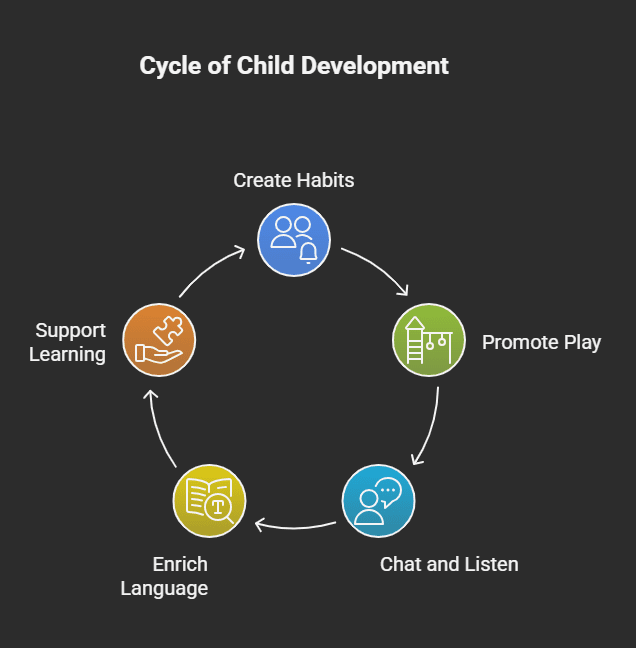Early childhood is an amazing time for brain development. Actually, by age five, a child’s brain is developing to about 90% capacity. That indicates that creating a healthier brain during those early years through healthy lifestyles provides a firm foundation for later learning and overall well-being. Parents and educators have a strong influence on that. By prioritizing good nutrition, adequate sleep, balanced media consumption, love of learning, and a stimulating home environment, adults can assist children and youth in building strong cognitive abilities that can last a lifetime.
Nutrition for Cognitive Development
What children eat directly affects their brain development and learning. A healthy diet with plenty of necessary nutrients enhances memory, attention, and problem-solving abilities. Some of the most important nutrients are:
- Omega-3 fatty acids (EPA and DHA): These “good fats” are key components of brain cells. Omega-3s support the growth and communication of neurons. Sufficient intake of omega-3s (from sources such as fatty fish, walnuts, and flaxseeds) is essential for proper brain function. For pregnant or lactating women, foods high in omega-3s can also promote infant brain growth.
- Iron: Iron transports oxygen to the brain and is required for learning and memory. Iron-deficient children usually exhibit delayed cognitive development. Even non-anemic iron deficiency has been associated with lower cognitive functioning in children and adolescents. Lean red meat, poultry, beans, and cereals are good sources. Having sufficient iron in the diet prevents these delays.
- Zinc: Zinc plays an important role in brain signaling and neurotransmitter function. Zinc deficiency can decrease attention, learning, and memory in children. Zinc assists in making new neurons and affects brain plasticity. Meat, seafood, whole grains, nuts, and seeds are sources of zinc.
- B vitamins (especially B6, B12, folate): B vitamins help with nerve function and making energy for the brain. Vitamin B12 is needed for insulating nerve fibers and brain growth. A lack of B12 in early life has been associated with slower motor and language development. Eggs, meat, dairy products, and green leafy vegetables are good food sources.
Preventing malnutrition is important: undernourished children lag in tests, and better-performing kids have regular meals. Even simple routines, such as never skipping breakfast, enhance attention and memory. Shoot for a rainbow on the plate: bright-colored fruits and vegetables, whole grains, and sufficient protein build and power young brains. If kids are finicky eaters, try blending healthy nutrients into foods they already like.
Nutrition Tip: Begin the day with a balanced breakfast. Adding whole grains, protein (such as eggs or yogurt), and a piece of fruit can stimulate your child’s attention and memory for morning school time.
Importance of Quality Sleep for Brain Health
Good sleep is like gasoline for a growing brain. While sleeping, children’s brains sort and save what they have learned throughout the day. Sleep also aids in brain development and emotional control. Children who get enough sleep generally have improved attention, memory, and school performance compared to those who don’t. Experts suggest:
- School-age children (6–12 years): 9–12 hours at night.
- Teenagers (13–17 years): 8–10 hours at night.
Sticking to these amounts each night supports optimal cognitive health. Too little sleep can lead to inattention, mood swings, and poorer learning. Inadequate sleep has even been linked to a higher risk of obesity and illness, which can further distract from school and play.
Good sleep quality is just as important. A restful bedroom (quiet, dark, and cool) and consistent bedtime routines help children fall asleep and stay asleep. Establish regular bedtimes, even on weekends. Restrict heavy meals or caffeine at night. Above all, switch off electronic screens (TVs, tablets, smartphones) at least 30 minutes before sleeping. The blue light emitted by screens can mislead the brain into believing that it’s still daytime and can lead to difficulty sleeping.
- Establish a routine: Bedtime and wake-up time must remain the same every day.
- Wind down: Listen to soothing music or read a book before bedtime rather than watching videos.
- Screen curfew: Ban TVs and tablets from the bedroom, and stash devices hours before bedtime.
Sleep Tip: Promote a calming bedtime routine. For instance, switch off screens at least 30 minutes prior to bedtime to assist your child in sleeping and enhance the quality of sleep. Reading or quiet play before lights-out can alert the brain that it’s time to sleep.
Effects of Screen Time on Developing Brains
Screens are omnipresent, yet excessive screen use actually gets in the way of learning and brain health. The research indicates that too much screen time (TV, tablets, smartphones) is associated with difficulties such as disrupted sleep, problems with attention, and even language delay. Young brains require active playtime and socializing; passive viewing on screens simply can’t compensate for it.
Guidelines by age:
- Less than 18 months: Do not use screens except for video-chatting with family.
- 18–24 months: If exposed to digital media, select highly high-quality education programs and watch together with your child.
- 2–5 years: Restrict to no more than 1 hour per day of high-quality programming, and attempt to co-view and discuss.
- 6 years old and above: Instead of a strict time limit, the emphasis is on consistent limits and supervision. Make sure screen time doesn’t replace sleep, exercise, homework, or in-person family time.
Increased screen time may translate into decreased time for hands-on learning, reading, and play. Heavy screen time has been associated by experts with lower school achievement and increased risk of depression and anxiety in adolescents. Teenagers who enjoy reading when young watch fewer hours of TV and sleep earlier by adolescence. Too much screen time is connected with attention deficits, poor weight, behavior problems, and language delay.
By establishing healthy boundaries, parents can help ensure children consume media in intelligent ways. Promote interactive, learning apps or programs, and whenever you can, watch with your child and probe (“What do you like about this? What did you learn?”). Moderation is essential: screens are a learning tool and should not replace real-world discovery, physical activity, and human interaction.
Promoting Lifelong Learning Habits
A curious, learning attitude is one of the greatest things you can bestow upon a child or adolescent. Children who enjoy reading, trying new things, and engaging in hobbies are likely to have more resilient brains. These are some methods to promote this:
- Reading for enjoyment: Get children to read for pleasure every day from an early age. Children who read for fun between the ages of 2–9 do better on tests of cognitive ability later in life. Early readers are better at verbal and memory tasks and even have bigger brain areas to use when learning. Attempt to make family reading time a daily occurrence.
- Encourage curiosity: Cultivate questions and inquiry. Easy routines such as taking nature walks and having your child report back on what they are seeing, or inviting “why” and “how” questions during dinner, have a significant impact. Curious kindergarten students perform equally well with higher-income children on reading and math exams.
- Hobbies and play: Provide support for interests such as art, music, science experiments, or sports. Practice and problem-solving activities develop cognitive skills. Ensure there is time for structured and unstructured activities. Allow children to pursue what they like to keep their brains active and flexible.
Lifelong learning tip: Balance scheduled schooling with unscheduled time. When kids get to choose their activities at times, they learn to make goals and figure things out independently. Encourage effort and curiosity to support a growth mindset.
Building a Brain-Boosting Home Environment

The home environment can fuel or slow brain development. Small adjustments in daily life can add up to huge benefits for a child’s brain:
- Create habits: Having consistent meal times, homework times, and bedtime creates a sense of security in children. Habits are what help the brain get things right.
- Promote play and discovery: Allow children time and space to play. Play is a child’s “work,” whether building with blocks, drawing, or playing tag outside. These things stimulate the brain to connect. Outdoor time is brain food, too: exercise boosts blood flow and aids memory.
- Chat and listen: Keep having conversations with your child regularly. It isn’t the sheer volume of words a child has heard, but the interactive exchanges that are most important. Talking to your child (not talking at them) and asking questions and listening for responses, you create neural paths associated with thinking and language.
- Create a language-rich environment: In the early years, especially, narrate everyday activities: describe what you’re doing, sing songs, and read picture books together. For teens, encourage family discussions about books, news, and events.
- Support challenges and learning together: Show your child how you enjoy learning. Work on a puzzle together, try a new recipe, or explore a science kit. Guide them patiently when they face tough problems to build resilience.
Conversation Tip: Develop brainpower with conversation! Practice back-and-forth chat and open-ended questioning with your child every day. This active dialogue enhances language development and mental acuity.
- Reduce stress and distractions: Peaceful, caring surroundings facilitate brain learning. Curtail hectic timetables and prevent ongoing overstimulation. Be loving and encouraging, stress-free loving homes allow children to explore and concentrate.
Summary: Bringing It All Together
Creating a smarter brain is a collaborative effort that begins early and accumulates piece by piece. By emphasizing good nutrition, sufficient sleep, healthy screen use, learning experiences, and a warm, stimulating home environment, parents and teachers can significantly boost a child’s intellectual development. Young children’s brains develop quickly, so the everyday habits outlined above can have a significant impact on how well children learn, remember, and adjust.
Even for teens, the same rules hold: a balanced diet, good rest, limits on screen distractions, and an inquiring mind will keep building a strong, resilient brain. Each child is different, but most will do well under regular care that involves lots of talking, playing, and hands-on activity.
By giving cognitive health the importance it deserves, such as eating whole food rather than snack-packaging or sleeping time versus midnight computer, television, or movie watching, caregivers can make brain-strengthening enhancements that shape generations to come.
































